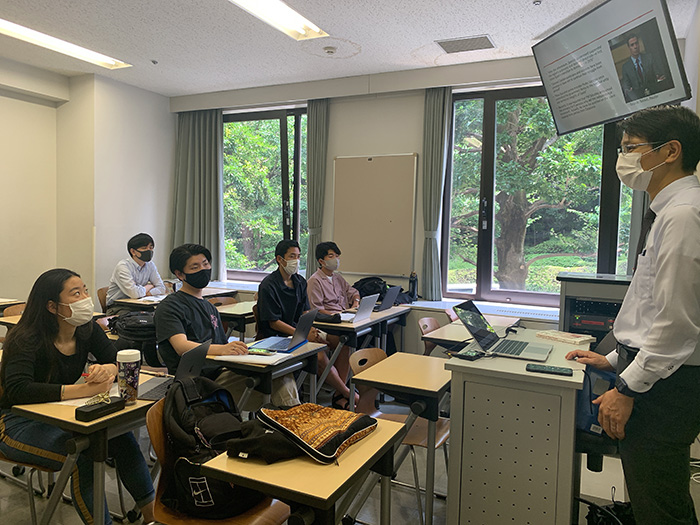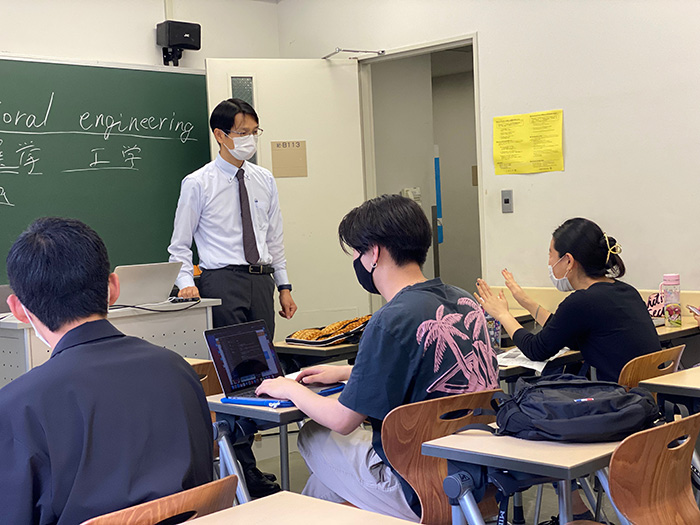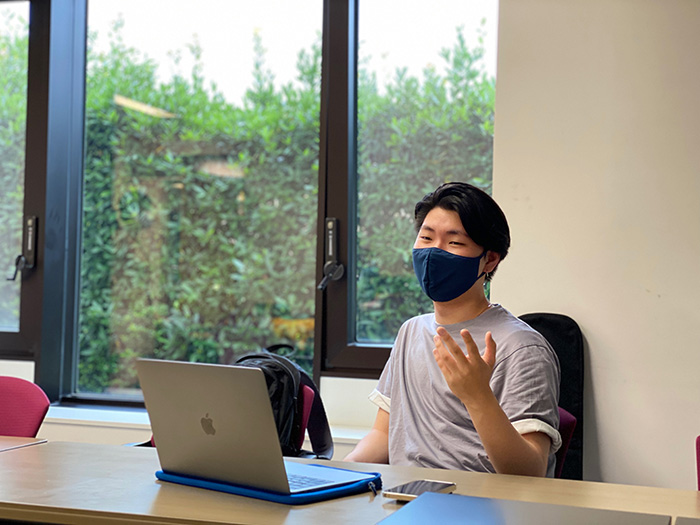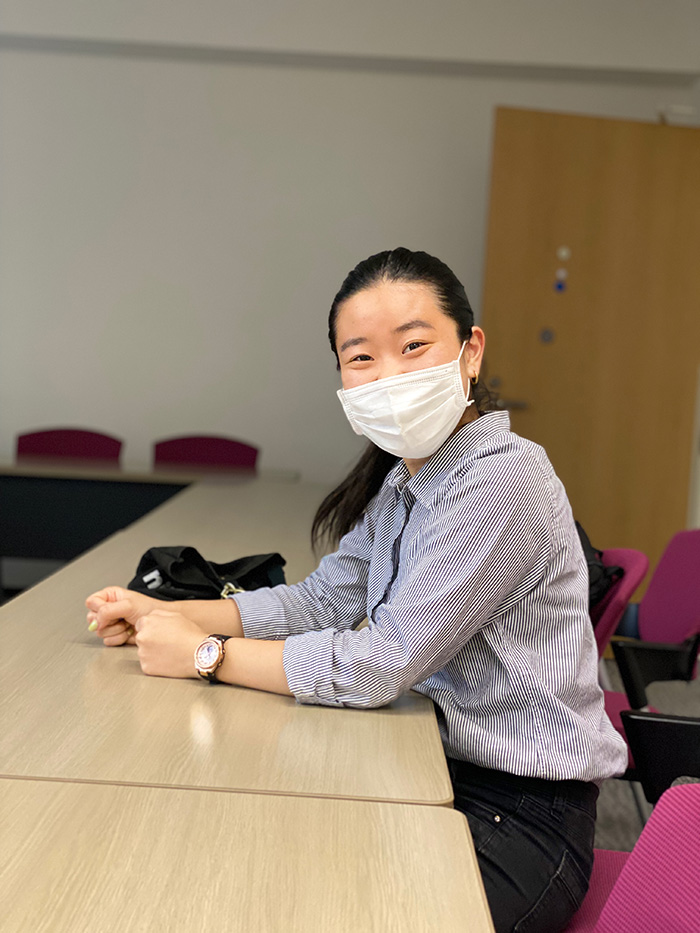授業紹介:民主主義と紛争
ADVANCED STUDIES(DEMOCRACY AND CONFLICT)
教員からのコメント Comment of Professor
本講義の「民主主義と紛争」というタイトルは奇妙に聞こえるかもしれません。民主主義は、投票や議論といったプロセスを通じて、個人や集団間の利害をすりあわせることで紛争を防ぎ解決する機能を有すると考えられるからです。しかし、実際には、民主的な制度の導入過程で多くの紛争が発生し、また、民主主義の名の下に民族などのアイデンティティに基づく政治が行われて、民主主義の理念が損なわれる事例も世界各地で見られてきました。また近年は、いわゆるポピュリスト的な政治勢力によって民主主義の制度に疑問が呈されていたり、さらには、権威主義化した政府が選挙など民主制度を利用しているだけの事例も見られています。このような問題点に焦点を当てていくと、実は私たちは民主主義の脆弱性や、単なる多数決の仕組みに形骸化して少数派を圧迫しかねない民主主義の問題点についてあまり考えていないのではないかということに気がつきます。

この講義では、紛争という切り口を通して、民主主義の脆弱性や問題点を浮き彫りにし、その解決方法、そしてあるべき民主主義の形を考えることを目的としています。まずは昨年(2020 年)の米国大統領選挙に焦点を当て、社会の分断と民主主義との関係について考えることから始め、それから教員が専門にしている欧州の新興民主主義国、さらには日本などの事例を扱い、これらにアイデンティティ、イデオロギー、格差などといった観点から分析を加えてきました。参加学生は、それぞれの持つバックグラウンドを生かしつつ、あるべき民主主義の形について活発に議論を繰り広げています。

Democracy is believed to prevent and resolve conflicts. That is because interests of peoples and groups can be represented and coordinated through democratic processes like elections and parliamentary discussions.
So, the title of this class “Democracy and Conflict” may sound strange. However, installations of democracy are often threatened by violent conflicts. Also, identity politics availing the name of democracy are rather common and damaging the value of democracy. And, recently, so-called populist politicians are questioning about democratic system itself. Furthermore, substantial autocratic governments are becoming to avail elections (often unfair ones) to legitimize their regimes. Focusing on those problems, we notice that we are not necessarily recognizing the vulnerability of democracy, or the flaw with the democracy that may reduce it into the mere majority rule.
Accordingly, I am attempting to clearly show those vulnerability and flaws of democracy by focusing on conflicts and inviting participating students to think about the solutions to those and better democratic systems. We have begun with the case of 2020 Presidential Election of the US and focused on the division of voters in society, then, we have thought about cases in new democracies in European periphery, that the lecturer has the expertise in, and Japan. Also, we have analyzed cases from the perspectives like identities, ideologies, and inequalities. Participating students have variety of backgrounds and, based on those, are actively discussing about the better ways for democracy.
学生からの声 class interview
この授業が英語で行われることは嬉しいことですが、それが受講の主な理由ではありません。政治分野の主要なキーワードを英語で学ぶことができるということは、自分の視野が広がることを意味します。また、担当教授のこの分野における豊富な知識と語彙により、学びを深めることができました。また、教授は必要に応じて日本語を使って個別の課題を詳しく説明することも厭いません。
(総合グローバル学部3 年 金城 初穂)
私はこの授業スタイルが好きです。まず先生から配られた資料を各自で学習し、クラスに集まったときに、資料から学んだことに基づいて議論します。ですから、この授業はただ講義受けるだけの授業ではありません。授業のおよそ6 割が講義で、残りの4 割が課題に対するディスカッションです。この方法は議論を深めると同時に、自分の学部での学びが世界のトップ大学と同じスタイルであることを実感できます。また、少人数制である為、質問を用意して教授からのフィードバックを受けることもできます。少人数制のクラスにおいては、制限というものを感じません。
先生は学生のニーズに合わせて授業を進めようとしてくれますし、私たち学生は皆異なるバックグラウンドを持ち、先生からもお互いからも学ぶことができるまたとない機会となっています。
(総合グローバル学部3 年 チャン テヒョン)
私は特定テーマを掘り下げることができる授業を受けるのが好きなタイプの学生です。民主主義と紛争についての授業を選択する際には、そのことを念頭に置きました。先生がこのテーマに関する豊富な経験を持っていることを知っていたので、ぜひ先生の授業を受けたいと思いました。実際に先生の経歴を拝見し、先生のプロフィールに受講のモチベーションと学習意欲をかき立てられました。
(チャン テヒョン)
この授業を受けたことで、授業のテーマを様々な問題にどのように結びつけるべきかを自問する機会が得られました。学内の授業だけでなく、海外の交換留学においても自分自身で授業につなげていく必要があると気づくことができ、留学に備えるための大切な機会になったと思います。さらに、政治への理解を深めるためにもっと多くの授業を受けようというチャレンジ精神とモチベーションが生まれました。例えば、私たちはヨーロッパの国々の理論的アプローチをたくさん学びます。それらの理論やアプローチを見ていると、自分が興味を持っている東南アジアという地域にどのように当てはまるのか、東南アジアの事例にはどのような特徴があるのかを知りたいと思うようになりました。一般的な理論から、より具体的な地域の事例に移るにはどうしたらよいかを考えるようになりました。この授業では、グローバルな政治理論とローカルな政治を結びつけています。グローバルな視点で政治理論を学びつつ、自分の持つのローカルな課題と世界で起きていることを結びつける得がたい機会だったと思います。
このクラスは実に多様な気づきを与えてくれました。上智大学で学ぼうとしている学生にはぜひお勧めしたいですね。
(金城 初穂 、チャン テヒョン )

I am happy that this class is conducted in English, but that is not my primary reason of taking this class. In this class, I get to learn major key words in the field of politics using English,therefore giving me a broader perspective. And I am especially grateful that my Professor has a great grip of the knowledge and vocabularies used in this field that have helped me learn. My professor also uses Japanese to elaborate specific issues where necessary.
(Hatsuho Kaneshiro, 3rd year, Faculty of Global Studies)
I love the style of this class. First, the professor distributes the reading materials, then when we gather in the class we discuss based on what we have learnt from the materials. This class does not therefore solely focus on lecture style. Approximately, the lecture takes around 60% while discussion on issues takes the rest 40%. This approach allows a deeper discussion, and also gives me a feeling that the learning styles in my department is like the leading universities in the world. The size of this class is also small, so I can prepare questions and get feedback from the professor. I do not feel any limitation in a small class. Professor Nakauchi is keen with connecting the class to the needs of the students, and because all of us as students have different backgrounds, this gives us a unique opportunity to learn both from the professor and also from other students.
(Taehyun Jang, 3rd year, Faculty of Global Studies)
I am the kind of a student who want to take very specific kind of classes. So that is what I was looking for when I choose the class on democracy and conflicts. I knew that the professor is experienced in this topic, so I was eager to take his class. I actually researched about the professor’s previous career engagement thus his profile gave me the motivation and the will to take this class.
(Taehyun Jang)
As I take this class, I have an opportunity to ask myself how I should connect the topic of this class to various issues. So, taking this class has opened my eyes to recognize the need to connect myself to the courses I take, not only within the university but also in overseas exchange programs. So, I think this is a great platform for preparation. Moreover, from this class, I get the challenge and the motivation to take more classes to deepen my understanding of politics. For example, we learn so many theoretical approaches from European countries. Going through these theories and approaches, I have desired to know how these theories are applicable to the region that I am interested in, that is South East Asia, and what is unique about the cases in South East Asia. I have started to think about how to move from the general theories to more specific local cases. This class connects the context of world politics with local politics. So, I am grateful to learn about theories of politics in the global context, but also get to incorporate my own local issues into to what is happening in the world. This class was an eye opener in many ways, so I highly recommend it to students enrolled at Sophia University.
(Hatsuho Kaneshiro, and Taehyun Jang)

